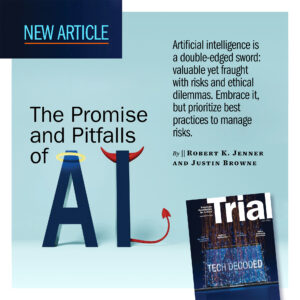
This piece is a follow-up to the article I co-authored with Justin Browne in this month’s edition of TRIAL magazine. That article explored the promise and peril of AI in the courtroom. Here, I take the conversation further by laying out the specific tools I believe every plaintiff’s lawyer should consider—and why they matter.
Technology isn’t replacing trial lawyers anytime soon, but it is changing how we build and win cases. As I say to my team, AI is not going to replace lawyers and paralegals, though it may replace lawyers and paralegals who aren’t using AI effectively.
From AI writing assistants to litigation command centers, this is the new toolkit for the plaintiff bar.
ChatGPT: The On-Demand Legal Brainstormer
ChatGPT has quickly become a secret weapon for creative and strategic thinking. Whether you’re outlining a complaint, crafting discovery responses, or finding the plain-English version of a complex issue for a client or jury, it’s always ready. It’s not a replacement for legal judgment, but it’s the best starting point in the game. Think of it as your associate who never sleeps—except you still have to check their work. Always think of AI tools as a “creative assistant,” a tool to help you come up with ideas, not one that will retrieve a “correct” answer, necessarily.
For a free legal consultation, call,
(888) 585-2188
Westlaw Precision + Co-Counsel: AI with a Legal Backbone
Westlaw’s evolution has been impressive. Precision’s document summary and timeline generation tools speed up case analysis, while Co-Counsel uses AI to find relevant caselaw, surface key documents, and flag issues—fast. It’s all backed by the trusted Westlaw ecosystem, which means better citations, fewer errors, and a workflow that actually fits how plaintiff lawyers practice. It’s pricey, but in my estimation, worth it.
Adobe Acrobat AI Assistant: The Hallucination Backstop
This is the unsung hero of your AI stack. When ChatGPT or Westlaw AI gives you a summary, you still need to verify it. Acrobat AI helps you do that—instantly. Highlight a section, get the pin cite, ask for an explanation. Most importantly, it lets you confirm that the AI didn’t make it up. In a world where hallucinated citations can lead to sanctions, Adobe AI is your trust-but-verify tool.
Complete a Free Case Evaluation form now
Everlaw: The Powerhouse for Big Cases
For major litigation—think mass torts, class actions, and institutional abuse cases—Everlaw is among the best. It’s not just a document review platform; it’s a litigation command center. With AI-powered search, tagging, issue coding, and integrated deposition tools, it allows teams to collaborate, build timelines, and prepare for trial seamlessly. When you’ve got a mountain of documents, Everlaw doesn’t just manage the chaos—it makes the important parts visible.
Call or text (888) 585-2188 or complete a Free Case Evaluation form
Deposition Tools: AI That Listens (and Remembers)
Preparing for or summarizing depositions used to take hours. Now, whether you’re using Everlaw’s deposition module, or other deposition AI programs, you can track testimony themes, spot contradictions, and build impeachment clips faster than ever. These tools let you extract what matters most—and build your case theory in real time.
The Bottom Line: It’s Still Your Judgment That Wins the Case
None of these tools replace your legal skills. But they do give you an edge—on speed, accuracy, and insight. And in the high-stakes world of plaintiff litigation, that edge can be the difference between a good case and a great result. The defense is using AI tools against you. You can sit idly by and get overloaded, or you can do something about it.
So yes, the tech is smart. But the lawyer using it still has to be smarter. And that’s where you come in.
